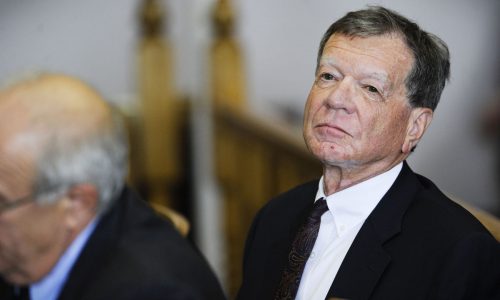Who’s watching the watcher?
That’s the question a Helena attorney hopes to pose with a legal brief filed Wednesday against Montana’s chief political regulator, one that accuses Commissioner of Political Practices Jonathan Motl of unlawfully dismissing, and failing to publicly disclose, a formal ethics complaint filed against him in December.
Motl — who serves as the chief arbiter of such ethical concerns, as well as administrative complaints raised on the campaign trail — neglected to disclose or avoid conflicts of interest before personally authoring that dismissal, according to the 20-page brief.
The filing, submitted by former Montana Republican Party attorney Jim Brown, asks a Lewis and Clark County District Court judge to reverse Motl’s dismissal and forward the ethics complaint to the Attorney General’s office.
It goes on to argue state law required Motl to recuse himself from considering that complaint, filed by Montana Trappers Association President James Buell, and asks the court to impose sanctions on the first-term commissioner for his “transgressions of public duty.”
The brief notes Buell’s complaint was rejected only one day after it was received, in a “gem” of a decision written by Motl “in the third person and actually referring to himself as ‘Jonathan Motl.’”
“In absolving Motl of any wrongdoing based on Motl’s investigation of Motl, Motl’s decision goes so far as to refuse to file the complaint for public record — a highly unusual step, and one without precedent in the law,” Brown wrote, referring to the largely redacted complaint notice filed on the commissioner’s website.
Brown — who has also represented anti-union political action groups targeted in Motl’s rulings — goes on to allege the commissioner ignored Buell’s request to have his complaint against Motl forwarded directly to the Attorney General’s office.
Motl said that office was made aware of the complaint, if only because that’s where the filing would’ve landed had he not dismissed it.
The commissioner added he had no misgivings about tossing the complaint, citing his own determination that state law does not require him to automatically recuse himself in such cases.
Motl, who has bowed out of two decisions over his three years in office, said he didn’t shy away from the Buell investigation in part because the costs associated with outsourcing such inquiries could strain his office’s limited budget — the same line of reasoning used to publicly answer some of the “half-dozen or more” recusal questions he said his office has fielded in the past.
The decision to dismiss the Buell complaint was reviewed by the same internal panel that vets the office’s other filings, Motl said. He didn’t recall anyone raising concerns about the move.
“(Recusing) isn’t responsible, either,” Motl added. “As commissioner, that’s your job, to make decisions.
“If a commissioner starts recusing, when do you stop?”
Conflicts denied
Wednesday’s court filing comes with a bit of a backstory.
In 2010, Buell and Motl, who was then working at a private legal practice, found themselves on opposite ends of an anti-trapping ballot measure battle that failed to make the ballot.
Four years later, an anti-trapping advocate affiliated with Motl’s former clients at Footloose Montana filed an administrative political complaint with the Commissioner of Political Practices’ office against two groups with ties Buell.
In September, Motl issued a decision in favor of his former clients, who at the time were represented by his ex-law partners.
The commissioner didn’t disclose his past ties to those clients or their lawyers in the decision, explaining at the time that he was far enough removed from private practice to avoid conflict-of-interest challenges.
In an interview on Monday, Motl said there “simply isn’t any basis for filing an ethics complaint” centered on a commissioner’s prior business interests.
His recusal in another case, which also involved a former client and “personal friend” in the anti-trapping community, did not go unnoticed by Buell’s attorney, who referenced the move as evidence the commissioner “knew that he was conflicted” when it came to acting on matters involving his client.
“There’s no check on the commissioner, that’s one of the problems with his office,” Brown told the Independent Record. “The whole office needs reform.”
Reforms proposed
Calls for such reforms aren’t exactly new.
Over the past four Legislative sessions, state lawmakers have introduced more than a dozen bills meant to increase, decrease or otherwise revise the powers afforded to the governor-appointed commissioner’s office.
None has succeeded in outright reorganizing the agency, despite some legislators’ calls to move the office under the umbrella of the Attorney General, or else devolve some its authority to a bipartisan or nonpartisan panel of regulators.
State Rep. Ryan Osmundson, R-Buffalo, has twice carried a bill that would have formed a review board to oversee the office.
Osmundson suspects those efforts failed in part because both major political parties see the commissioner’s decisions as a useful campaign weapon.
“I just look at the structure of (the office) and I don’t care who you are, it’s wrong,” Osmundson said in February. “The first time I ran (the bill), they told me it wouldn’t work because whoever’s in power wants to be able to use (the office) as a club against their opponents.
“I know maybe it’s idealistic, but in our system of government, you shouldn’t have a czar,” he said.
Osmundson suspects similar bills would have to be introduced as many as a dozen times to gain any traction.
Fellow state Rep. Steve Fitzpatrick, R-Great Falls, was inclined to agree.
“It’s been something that’s been complained about for some time,” he said early this year. “But no, I don’t think there are the votes to do it.”
Motl expects to file a formal answer to Buell’s legal brief by the end of the week.

